|
|
 |
Fiche d'espèce de Copépode |
|
|
Cyclopoida ( Ordre ) |
|
|
|
Corycaeidae ( Famille ) |
|
|
|
Corycaeus ( Genre ) |
|
|
|
Urocorycaeus ( Sous-Genre ) |
|
|
| |
Corycaeus (Urocorycaeus) furcifer Claus, 1863 (F,M) | |
| | | | | | | Syn.: | ? Corycaeus varius : Brady, 1883 (p.111, figs.F,M); Thompson, 1888 b (p.153); T. Scott, 1894 b (p.110);
Corycäus furcifer : Giesbrecht, 1892 (p.660, 674, 771, figs.F,M);
Corycaeus furcifer : Bainbridge, 1972 (p.61, Appendix Table I: vertical distribution vs day/night, Table II: %); Corral Estrada & Pereiro Muñoz, 1974 (tab.I); Böttger-Schnack, 1997 (p.409); Avancini & al., 2006 (p.146, Pl. 114, figs.F,M, Rem.);
Urocorycaeus furcifer : Baldina, 1970 (p.507); Böttger-Schnack, 1995 (p.92); Boxshall & Halsey, 2004 (p.493, p.492: fig.F); Valdés & al., 2007 (p.104: tab.1); Vidjak & Bojanic, 2009 (p.432, Table II, IV, V); Vives & Shmeleva, 2010 (p.242, figs.F,M, Rem.); Isari & al., 2011 (p.51, Table 2, abundance vs distribution); Belmonte & al., 2013 (p.222, Table 2, abundance vs stations); Zakaria & al., 2016 (p.1, Table 1); El Arraj & al., 2017 (p.272, table 2); | | | | Ref.: | | | Claus, 1863 (p.157, figs.F,M); F. Dahl, 1894 (p.70); Thompson, 1900 c (p.291); Thompson & Scott, 1903 (p.239, 285); A. Scott, 1909 (p.248, Rem.); Wolfenden, 1911 (p.359); M. Dahl, 1912 (p.48, figs.F,M); Farran, 1926 (p.299); 1929 (p.211, 294); Rose, 1929 (p.71); 1933 a (p.334, figs.F,M); Klevenhusen, 1933 a (p.91, carte 41); Dakin & Colefax, 1933 (p.209); Farran, 1936 a (p.136); Lysholm & al., 1945 (p.44); Sewell, 1948 (p.346, 461, 515); Marques, 1958 a (p.147, Rem.); Tanaka, 1957 (p.85, figs.F); Fagetti, 1962 (p.52); Cervigon, 1964 (p.179, figs.F,M); Vilela, 1968 (p.37, figs.F,M); Ramirez, 1969 (p.97, fig.F); Corral Estrada, 1970 (p.246); Razouls, 1972 (p.96, Annexe: p.136); Chen & al., 1974 (p.57, figs.F,M); Razouls, 1974 c (1975) (p.93); Dawson & Knatz, 1980 (p.10, figs.F,M); Björnberg & al., 1981 (p.675, figs.F,M); Lakkis & Zeidane,1987 (p.22, Rem.); Chihara & Murano, 1997 (p.962, Pl.212: F,M); Boxshall, 1998 (p.225); Bradford-Grieve & al., 1999 (p.888, 975, figs.F,M); | 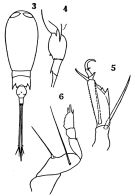 issued from : O. Tanaka in J. Fac. Agricult. Kyushu Univ., 1957, 11 (1). [Pl.6, Figs.3-6]. Female (from Japanese waters): 3, habitus (dorsal); 4, urosome (lateral right side); 5, A2; 6, P4. Nota: The abdominal segments and furca in the proportional lengths 20:12:68. Lateral processes of 3rd thoracic segment extend to the proximal 1/3 of genital segment. Genital segment with a rounded process on the dorsal surface about the middle. Anal segment with 2 sharp spines on the dorsal surface at the distal margin.
|
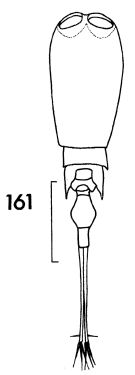 issued from : F.C. Ramirez in Contr. Inst. Biol. mar., Buenos Aires, 1969, 98. [p.94, Lam. XIX, figs. 161]. Female (from off Mar del Plata): 161, habitus (dorsal). Scale bar in mm: 0.4.
|
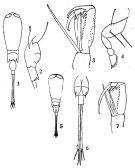 issued from : Q.-c Chen & S.-z. Zhang & C.-s. Zhu in Studia Marina Sinica, 1974, 9. [Pl.17, Figs.1-7]. Female (from China Seas): 1, habitus (dorsal); 2, urosome (lateral left side); 3, A2; 4, P4. Male: 5, habitus (dorsal); 6, urosome (dorsal); 7, A2.
|
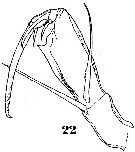 Issued from : W. Giesbrecht in Systematik und Faunistik der Pelagischen Copepoden des Golfes von Neapel und der angrenzenden Meeres-Abschnitte. – Fauna Flora Golf. Neapel, 1892. Atlas von 54 Tafeln. [Taf.49, Fig.22]. As Corycäus furcifer. Male: 22, A2.
|
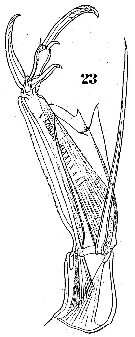 Issued from : W. Giesbrecht in Systematik und Faunistik der Pelagischen Copepoden des Golfes von Neapel und der angrenzenden Meeres-Abschnitte. – Fauna Flora Golf. Neapel, 1892. Atlas von 54 Tafeln. [Taf.49, Fig.23]. As Corycäus furcifer. Female: 23, A2.
|
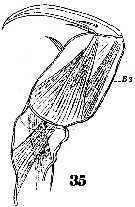 Issued from : W. Giesbrecht in Systematik und Faunistik der Pelagischen Copepoden des Golfes von Neapel und der angrenzenden Meeres-Abschnitte. – Fauna Flora Golf. Neapel, 1892. Atlas von 54 Tafeln. [Taf.49, Fig.35]. As Corycäus furcifer. Female: 35, Mxp.
|
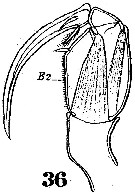 Issued from : W. Giesbrecht in Systematik und Faunistik der Pelagischen Copepoden des Golfes von Neapel und der angrenzenden Meeres-Abschnitte. – Fauna Flora Golf. Neapel, 1892. Atlas von 54 Tafeln. [Taf.49, Fig.36]. As Corucäus furcifer. Male: 36, Mxp. B = basipod.
|
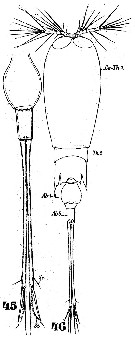 Issued from : W. Giesbrecht in Systematik und Faunistik der Pelagischen Copepoden des Golfes von Neapel und der angrenzenden Meeres-Abschnitte. – Fauna Flora Golf. Neapel, 1892. Atlas von 54 Tafeln. [Taf.51, Figs.45, 46]. as Corycäus furcifer. Female: 45, urosome (ventral); 46, habitus (dorsal)..
|
 Issued from : W. Giesbrecht in Systematik und Faunistik der Pelagischen Copepoden des Golfes von Neapel und der angrenzenden Meeres-Abschnitte. – Fauna Flora Golf. Neapel, 1892. Atlas von 54 Tafeln. [Taf.51, Fig.44]. As Corycäus furcifer. Male: 44, urosome (ventral).
|
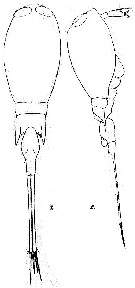 issued from : M. Dahl in Ergebnisse der Plankton-Expedition der Humboldt-Stiftung. Bd II, G. f1. I. Die Corycaeinen 1912. [Taf.VIII, Figs.1, 2]. Female: 1, habitus (dorsal); 2, idem (lateral left side).
|
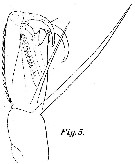 issued from : M. Dahl in Ergebnisse der Plankton-Expedition der Humboldt-Stiftung. Bd II, G. f1. I. Die Corycaeinen 1912. [Taf.VIII, Fig.5, A2.
|
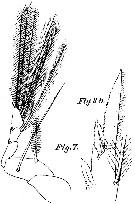 issued from : M. Dahl in Ergebnisse der Plankton-Expedition der Humboldt-Stiftung. Bd II, G. f1. I. Die Corycaeinen 1912. [Taf.VIII, Figs.7, 8b]. Female: 7, P4; 8b, terminal part of exopod of P1.
|
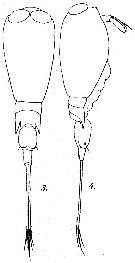 issued from : M. Dahl in Ergebnisse der Plankton-Expedition der Humboldt-Stiftung. Bd II, G. f1. I. Die Corycaeinen 1912. [Taf.VIII, Figs.3, 4]. Male: 3, habitus (dorsal); 4, idem (lateral right side).
|
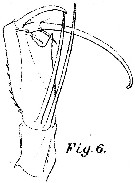 issued from : M. Dahl in Ergebnisse der Plankton-Expedition der Humboldt-Stiftung. Bd II, G. f1. I. Die Corycaeinen 1912. [Taf.VIII, Fig.6]. Male: 6, A2.
|
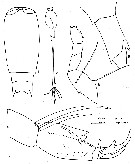 issued from : F. Cervigon iin Mem. Soc. Cienc. nat. La Salle, 1964, 24 (68). [p.180, Lam.11]. As Urocorycaeus furcifer. Female (from Venezuela): 1, prosome (dorsal); 2, abdomen (lateral); 3, genital segment; 4, A2; 5, P4. Nota: Lengths ratio genital , anal segments and caudal rami 23:11:66
|
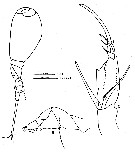 issued from : F. Cervigon iin Mem. Soc. Cienc. nat. La Salle, 1964, 24 (68). [p.181, Lam.12]. As Urocorycaeus furcifer. Male: 1, habitus (lateral); 2, A2; 3, P4. Nota: Lengths ratio genital , anal segments and caudal rami 30:12:58.
|
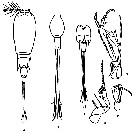 Issued from : F. Vives & A.A. Shmeleva in Fauna Iberica, 2010, 33. [p.242, Fig.113]. After Dahl, 1912. Female: A, habitus (dorsal); B, abdomen; C, A2; D, P4. Nota: Caudal rami more than 2 times length of urosomal seggments. Male: E, abdomen; F, A2. Nota: Caudal rami more than 1.5 times length than urosomal segments.
| | | | | Ref. compl.: | | | Cleve, 1904 a (p.188); Massuti Alzamora, 1942 (p.107, Rem.); Wilson, 1942 a (p.181); 1950 (p.193); Ganapati & Shanthakumari, 1962 (p.10, 16); Duran, 1963 (p.26); V.N. Greze, 1963 a (tabl.2); Shmeleva, 1965 b (p.1350, lengths-volume-weight relation); Pavlova, 1966 (p.45); Neto & Paiva, 1966 (p.33, Table III); Furuhashi, 1966 a (p.295, vertical distribution in Kuroshio region, Table 9, 10); Mazza, 1966 (p.74); 1967 (p.367); Evans, 1968 (p.12); Dowidar & El-Maghraby, 1970 (p.268); Deevey, 1971 (p.224); Carli, 1971 (p.373, tab.2); Apostolopoulou, 1972 (p.329, 386); Binet & al., 1972 (p.69); Meenakshikunjamma, 1974 (p.770: biogéo.); Vives & al., 1975 (p.58, tab.II); Deevey & Brooks, 1977 (p.156, tab.2, Station "S"); Dessier, 1979 (p.208); Boxshall, 1977 b (p.553, 555: Rem.); Vaissière & Séguin, 1980 (p.23, tab.1); Rudyakov, 1982 (p.208, Table 2); Vives, 1982 (p.296); Kovalev & Shmeleva, 1982 (p.86); Scotto di Carlo & Ianora, 1983 (p.150); Guangshan & Honglin, 1984 (p.118, tab.); Scotto di Carlo & al., 1984 (p.1042); Regner, 1985 (p.11, Rem.: p.44); Jansa, 1985 (p.108, Tabl.I, II, IV, V); Lozano Soldevilla & al., 1988 (p.61); Hernandez-Trujillo, 1989 a (tab.1); Scotto di Carlo & al., 1991 (p.271); Shih & Young, 1995 (p.76); Hajderi, 1995 (p.542); Go & al., 1997 (tab.1); Suarez-Morales & Gasca, 1997 (p.1525); Hure & Krsinic, 1998 (p.93, 105); Suarez-Morales & Gasca, 1998 a (p.112); Lapernat, 1999 (p.33); Siokou-Frangou, 1999 (p.479); Razouls & al., 2000 (p.343, tab. 5, Appendix); Suarez-Morales & Gasca, 2000 (1247, tab.1); Seridji & Hafferssas, 2000 (tab.1); d'Elbée, 2001 (tabl. 1); Zerouali & Melhaoui, 2002 (p.91, Tableau I); Hsieh & al., 2004 (p.398, tab.1); Daly Yahia & al., 2004 (p.366, fig.4); Lo & al., 2004 (p.89, tab.1); Vukanic & Vukanic, 2004 (p.9, tab. 2); Isari & al., 2006 (p.241, tab.II); Lavaniegos Jiménez-Pérez, 2006 (p.141, tab.2, Rem.); Zervoudaki & al., 2006 (p.149, Table I); Khelifi-Touhami & al., 2007 (p.327, Table 1); Morales-Ramirez & Suarez-Morales, 2008 (p.515); Ayon & al., 2008 (p.238, Table 4: Peruvian samples); Raybaud & al., 2008 (p.1765, Table A1); C.-Y. Lee & al., 2009 (p.151, Tab.2); Licandro & Icardi, 2009 (p.17, Table 4); Brugnano & al., 2010 (p.312, Table 3, fg.8); Williamson & McGowan, 2010 (p.273, Table 3, Pacific central gyres: N and S, as furcifera); Mazzocchi & Di Capua, 2010 (p.428); Hsiao S.H. & al., 2011 (p.475, Appendix I); Selifonova, 2011 a (p.77, Table 1, alien species in Black Sea); Shiganova & al., 2012 (p.61, Table 4) ; Uysal & Shmeleva, 2012 (p.909, Table I); Brugnano & al., 2012 (p.207, Table 2, 3); Gubanova & al., 2013 (in press, p.4, Table 2); in CalCOFI regional list (MDO, Nov. 2013; M. Ohman, comm. pers.); Lidvanov & al., 2013 (p.290, Table 2, % composition); Pansera & al., 2014 (p.221, Table 2, abundance); Mazzocchi & al., 2014 (p.64, Table 4, 5, abundance); Zaafa & al., 2014 (p.67, Table I, occurrence); Benedetti & al., 2016 (p.159, Table I, fig.1, functional characters); Benedetti & al., 2018 (p.1, Fig.2: ecological functional group) | | | | NZ: | 18 + 1 douteuse | | |
|
Carte de distribution de Corycaeus (Urocorycaeus) furcifer par zones géographiques
|
| | | | | | | | | | | | | | |  issued from : P.P. Meenakshikunjamma in J. mar. biol. Ass. India, 1974, 16 (3). [p.770, Fig.1]. issued from : P.P. Meenakshikunjamma in J. mar. biol. Ass. India, 1974, 16 (3). [p.770, Fig.1].
Distribution of Corycaeus (Urocorycaeus) furcifer in the Indian Ocean. |
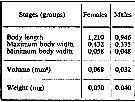 issued from : A.A. Shmeleva in Bull. Inst. Oceanogr., Monaco, 1965, 65 (n°1351). [Table 6: 46]. Corycaeus furcifer (from South Adriatic). issued from : A.A. Shmeleva in Bull. Inst. Oceanogr., Monaco, 1965, 65 (n°1351). [Table 6: 46]. Corycaeus furcifer (from South Adriatic).
Dimensions, volume and Weight wet. Means for 50-60 specimens. Volume and weight calculated by geometrical method. Assumed that the specific gravity of the Copepod body is equal to 1, then the volume will correspond to the weight. |
| | | | Loc: | | | Antarct. (Ross Sea, in Farran, 1929, p.294), South Africa (E & W), Namibia, off Ascension Is. (N & S), Angola, Baia Farta, G. of Guinea, Ivorian shelf, off E St. Paul Is., Cape Verde Is., Canary Is., off Morocco-Mauritania, off Madeira, off Azores (W & N), Argentina, Rio de Janeiro, Brazil, off Amazon, Bay of Biscay, Lisbon, W Gibraltar, Venezuela, Caribbean Sea, Caribbean, Yucatan, E Costa Rica, G. of Mexico, Sargasso Sea, off Bermuda (Station "S"), Ibero-moroccan Bay, off W Tangier, Medit. (Alboran Sea, Gulf of Annaba, Castellon, Baleares, Banyuls, Marseille, Ligurian Sea, Tyrrhenian Sea, Lake Faro, Messina, Gulf of Taranto, Adriatic Sea, Malta, Ionian Sea, Aegean Sea, Thracian Sea, Marmara Sea, Black Sea, Lebanon Basin, W Egyptian coast, Alexandria), Red Sea, G. of Aden, Sri Lanka, Madagascar (Nosy Bé), Indian, India (Lawson's Bay), Indonesia-Malaysia, Philippines, China Seas (East China Sea, South China Sea), Taiwan (E, NW, Mienhua Canyon), Okinawa, Japan (very rare), Kuroshio zone, Bering Sea (in C.B. Wilson, 1950), Pacif. (W equatorial), (p.273, Pacific (central gyres: N and S), Australia (Great Barrier, New South Wales), New Zealand, off Hawaii, California (San Pedro Bay), W Baja California, Galapagos, Peru, off Chile | | | | N: | 135 | | | | Lg.: | | | (34) F: 1,74-1,7; M: 1,27-1,23; (35) F: 2,04-1,8; M: 1,32-1,25; (38) F: 1,92-1,76; M: 1,3-1,2; (46) F: 1,83-1,7; M: 1,35-1,25; (107) F: 1,92; (109) F: 2,1; M: 1,3; (180) F: 1,76-1,7; (254) F ± 1,6; (327) F: 1,95-1,85; M: 1,46-1,32; (340) F: 1,75-1,4; M: 1,3; (618) F: 2,06-1,83; M: 1,68-1,37; (666) F: 2,02-1,96; M: 1,27; (668) F: 1,79; M: 1,28; (670) F: 1,79-1,73; M: 1,38-1,32; (866) M: 1,41; (920) F: 1,75; {F: 1,40-2,10; M: 1,20-1,46} | | | | Rem.: | épi- mésopélagique.
Sampling depth (Antarct.) : 0-1000 m.
Voir aussi les remarques en anglais | | | Dernière mise à jour : 25/10/2022 | |
|
|
 Toute utilisation de ce site pour une publication sera mentionnée avec la référence suivante : Toute utilisation de ce site pour une publication sera mentionnée avec la référence suivante :
Razouls C., Desreumaux N., Kouwenberg J. et de Bovée F., 2005-2026. - Biodiversité des Copépodes planctoniques marins (morphologie, répartition géographique et données biologiques). Sorbonne Université, CNRS. Disponible sur http://copepodes.obs-banyuls.fr [Accédé le 20 février 2026] © copyright 2005-2026 Sorbonne Université, CNRS
|
|
 |
 |






















